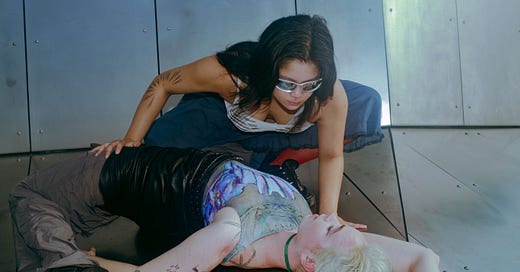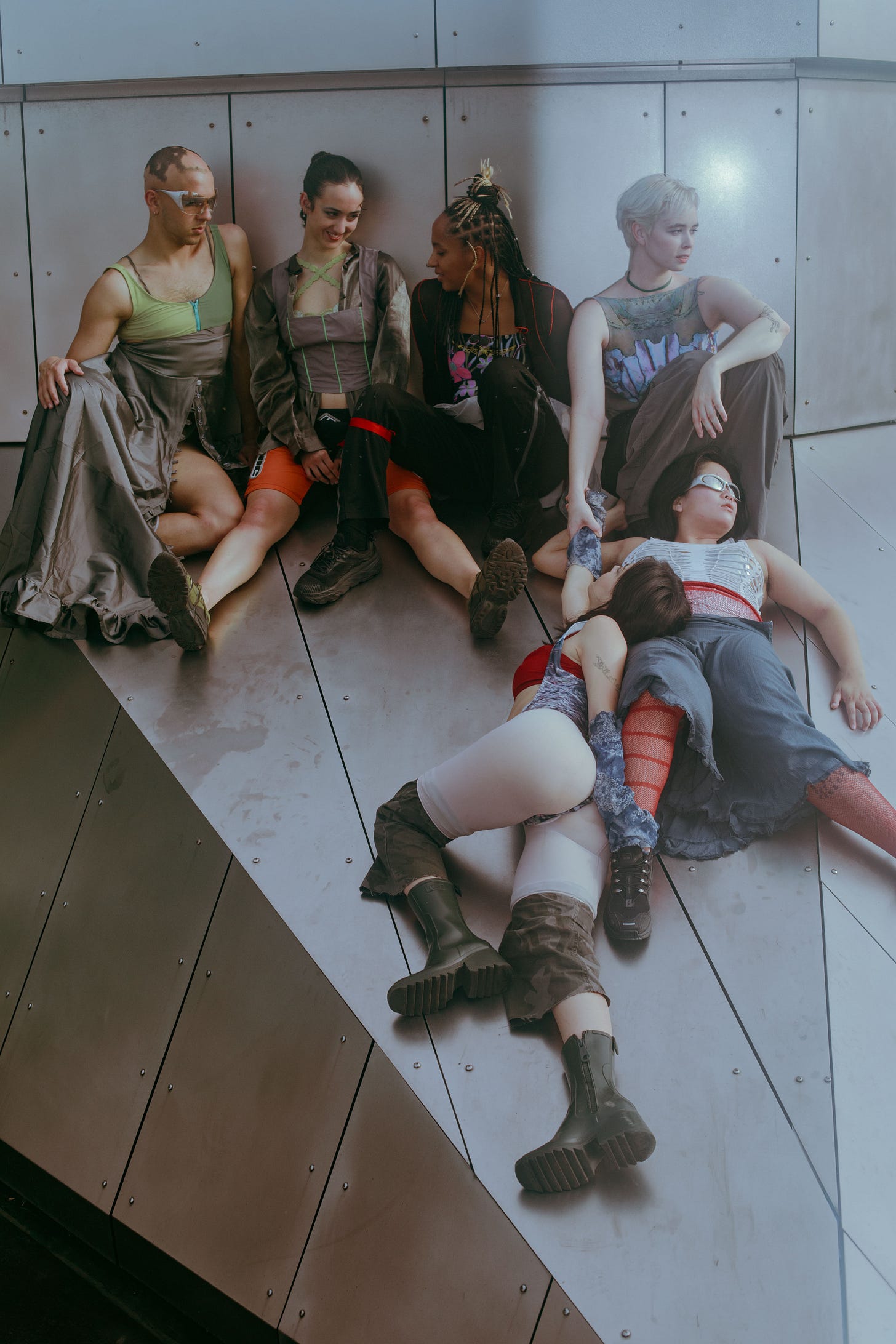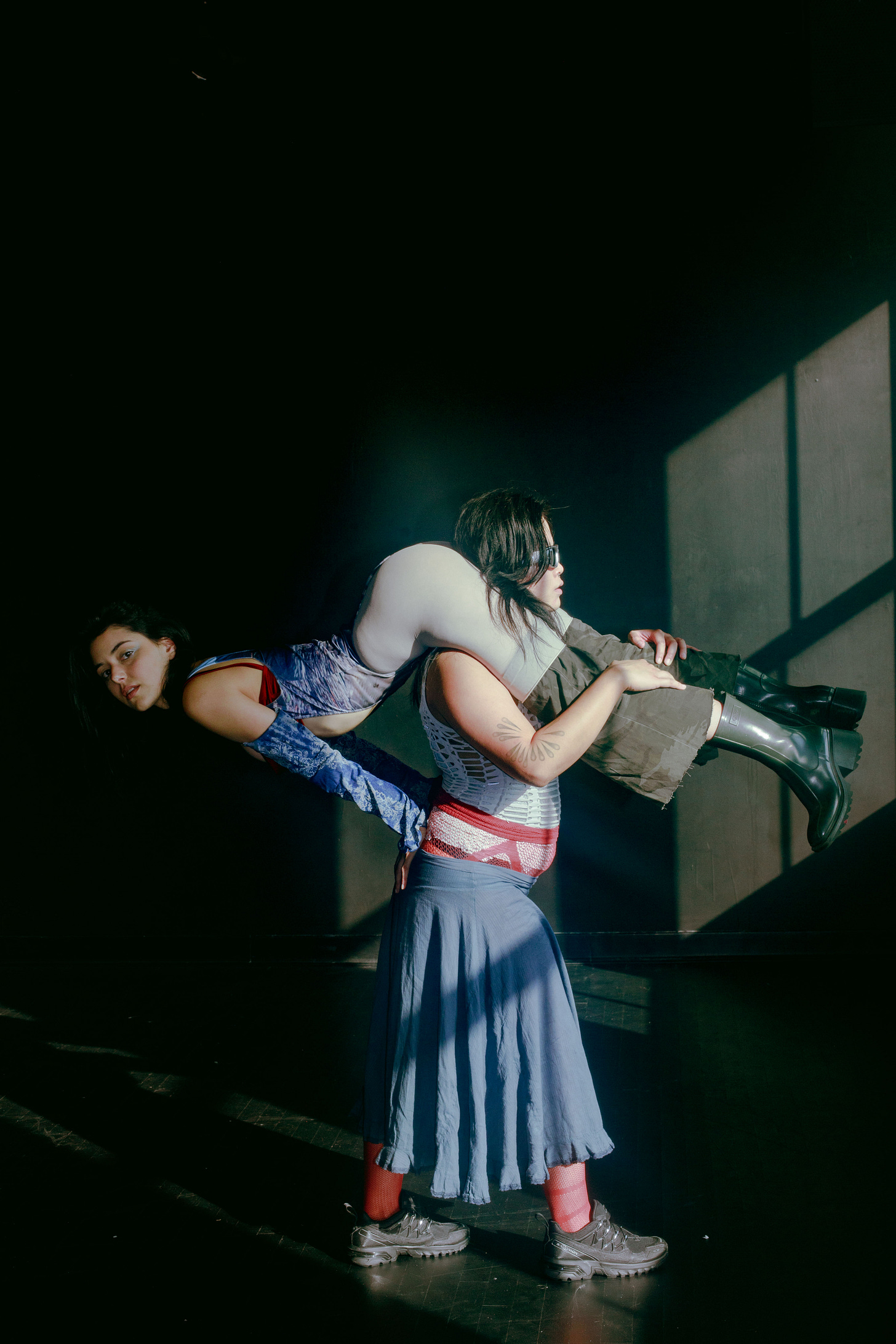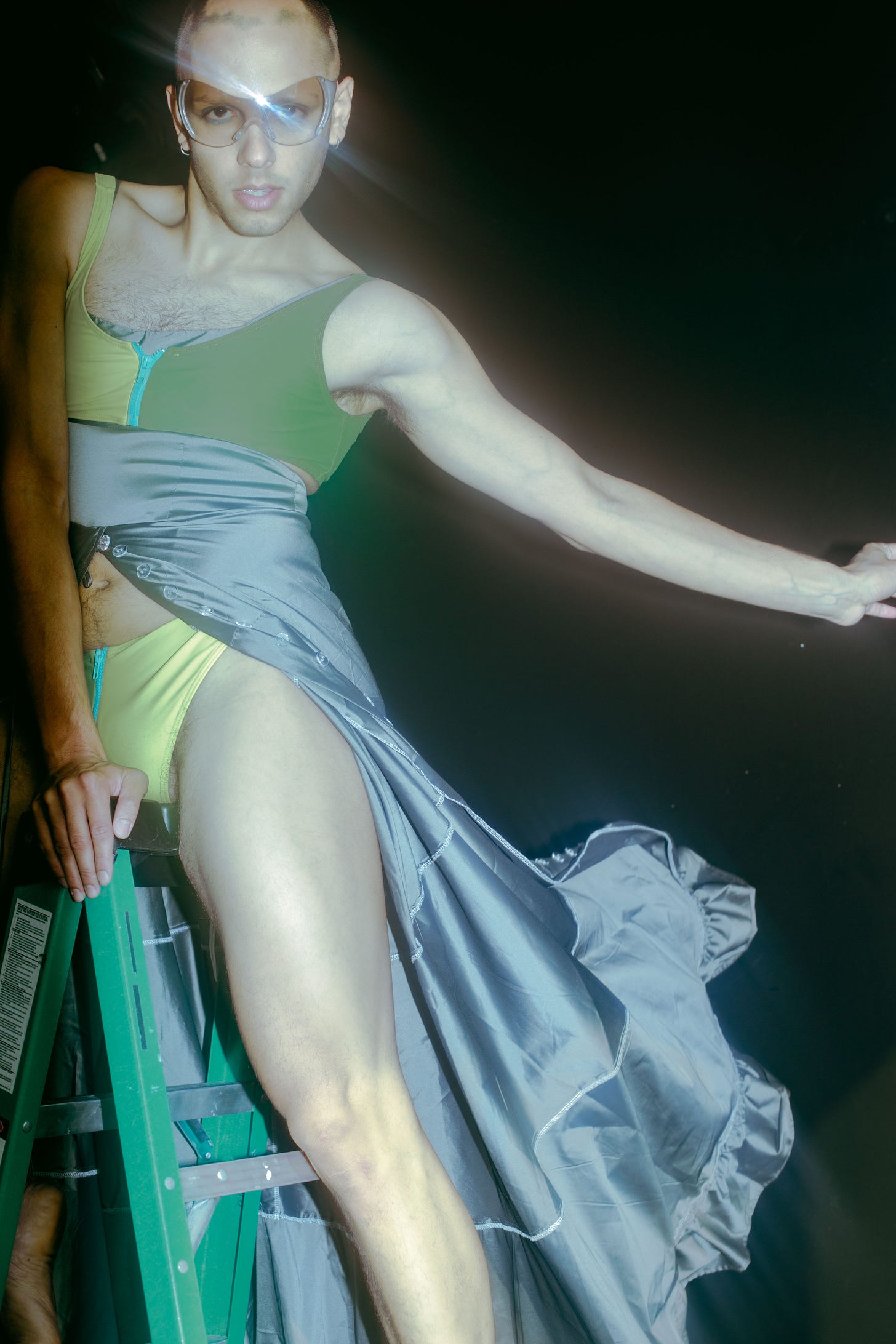Lesbian Survivor Fantasy League with Cole Stapleton and Mimi Doan of Company [REDACTED]
Will you survive microdosing the apocalypse?
[Mimi Doan and Cole Stapleton. All photos by Joohee Park]
Cole Stapleton and Mimi Doan are Queens-based artists who have collaborated as choreographers since 2019 and co-direct work as Company [REDACTED]. Their first evening-length work, Some Land of Redemption, premiered with two sold-out performances at The Center for Performance Research in February of 2022, and since then they’ve been invited to present work internationally and at dance festivals throughout New York City.
I made the score for Some Land of Redemption, as well as working on the score (and vocal composition) for a new piece titled My Apocalypse that will premiere this fall at The Tank.
I called Cole and Mimi up to talk about our work together the other day. The following is our conversation, edited for clarity.
[Cast of My Apocalypse. Top from left to right: Demetris Charalambous, Cristina Moya-Palacios, Sophia Parker, Cole Stapleton. Bottom from left to right: Slic and Mimi Doan. Cast members not pictured: Valentina Baché Rodríguez, David Attenberger and Avery Gerhardt]
Slic: First question. The piece we're working on is called My Apocalypse. It's about how gay and trans people specifically might navigate the end of the world in New York City. That's my interpretation. Do you think that you would survive the apocalypse? Why or why not?
Mimi: I was actually voted most likely to survive the apocalypse in high school, which I think was a great misunderstanding of who I am and what I'm actually capable of because I think I would be the first to die. I simply wouldn't have the will to try to survive. If my loved ones were dead and the world was in shambles, I’m not going to try to live. For what?
Cole: You know this about me, but I'm fascinated with the TV show Survivor. I'm taking this in a different direction, but I do think Survivor is the epitome of the American experiment. We have in the past participated in a lesbian fantasy league for Survivor. I feel like I’m a real badass because I watch Survivor. I am convinced that I would survive the apocalypse.
Slic: Okay, I have follow-up questions. From watching the TV show Survivor, you think you’ve gained enough survival skills to make it through the apocalypse?
Cole: Yes.
Slic: And psychologically, you would do okay.
Cole: I'm not sure psychologically I would do okay. But, I’m generally anxious already and kind of always trying to prepare for the worst. I feel that way in the pandemic a little bit, too, where it's like: if you're a hypochondriac and you're always worried something horrible is going to happen, and then the human race is going to get this horrible disease, you’re a little bit like, “I told you so” You're a little bit like, “I already thought this was going to happen.”
Slic: You said something that resonates with me, which is that like life right now is kind of preparing us for the apocalypse. It’s like we’re microdosing the apocalypse at all times.
Cole: Yes, exactly.
Slic: I want to go back to the lesbian Survivor fantasy league. What does that mean?
Cole: It's just to vote on who you think will be voted out and people will make their drafts and try to guess who wins.
Slic: So the people voting on it are lesbians, not the Survivor contestants.
Cole: The contestants are not all lesbians, no. Though there is always like, one really sturdy dyke on the show. One year there was an iconic lesbian that was very close to winning. It was really sad, but it was very exciting. LA [Warman, who runs a school and invited Cole and Mimi to be a part of this lesbian Survivor fantasy league] almost got that person to come and meet our group.
Slic: You’re saying Survivor always casts sturdy dykes. I'm assuming they fall more on the butch end of the lesbian spectrum. Has there ever been a hyper-femme, pillow princess-type character on Survivor?
Cole: Oh, there's never been a pillow princess type, at least not one that’s out anyway. The lesbian representation that we get on that show does fall somewhere on the butch end of the spectrum. But they're always the best players. They're very, very skilled. I do think lesbians would make it pretty far in an apocalypse situation.
Slic: You both have really different backgrounds in dance and choreography. What is the story of how you became a dancer and how you ended up choreographing this piece today?
Cole: My background is very…classical is the right word. I was told I started late, which is crazy because I started when I was 8. I always had this feeling of kind of catching up. Even though I committed to it for the better part of 25 years.
I was in a ballet school, I had my first sapphic experiences in ballet school. So it actually feels related to the origins of this piece of work. But Mimi and I started working together in 2020 when I was working on a solo, and I literally begged them to come to the dance studio to help me with it. That was right before we met you. The origin of Company [REDACTED] feels threaded through the three of us.
[Slic and Mimi]
Mimi: I don't have any formal training whatsoever and I started dancing not to make dance, but just to be in my own body. I used to organize my life around being able to rave and go out. Not to go out and hang out with people, mostly to exert myself and feel the sensation of having danced for 12 hours straight and to know that my body is capable of doing that. During the pandemic, I started to not have access to dancing at all. I actually became quite agoraphobic. I didn't really want to go out of the house whatsoever.
Part of the whole motivation for Cole asking me to go to the studio was to try to force me to leave the apartment that we shared with five other people. I remember the very first studio session that we had, I had no idea why Cole had brought me there. I was actively grumpy. I got up on this ladder and started reading poems to Cole. That was how we started collaborating, and we never stopped.
Slic: I can't believe I didn't know that about you, that going to raves was the source of dancing in your life, and then because the pandemic happened, you lost access to that. That's literally what happened to me. I don't think that if I had had consistent access over the last three years to going out the way that I did before, I would have ever been like, “I need to involve myself in some sort of choreographed dance.” When I get to go dancing, I feel better. It's like a whole body reset.
Cole: Yeah, whole body reset. And I think that that's also a shared origin point in our dance background, even though we come from quite divergent origins within it is, I think especially for us both being trans, dance has been a way to feel really present in our bodies.
You know, my pathway with dance, it’s quite punitive and really controlling. That also felt like a way of being free somehow. I think what it gave me and has always given me has been a set of guidelines for how to be in a body. And then with Mimi and other collaborators, I also learned how to reject those guidelines, but it's the same type of freedom. You can achieve that freedom through really going out of bounds and you can also achieve that freedom through control. And I think that that's a tension that we're really trying to think about and tease out in the show we’re currently making.
Slic: Okay, I have my last question. How important is it to you two as directors that the audience understand exactly what's happening in the narrative of what you're making? Or is there something else that you're prioritizing communicating?
[Cristina and Sophia]
Cole: I’ll speak for myself because I think sometimes we differ about that as co-directors. One of the best things about working in a model that has co-directors is that you have such diverse opinions and I think it makes the work so much richer. I think for us the work always starts as a feeling.
I think because sensation is so much the kernel of what we have to say, the narrative is something that follows. Obviously, you know, from being in this work that it is very narrative. But it's not traditionally narrative. And so we are less invested so much in people being able to describe the specific kind of situation of the work and where the characters go and we’re more invested in the audience having an understanding of the transformation of feeling that we're trying to illustrate. The feeling at the beginning of the show should be one thing, and then by the end of the show, it should really be something else.
Mimi: We have a very specific idea of what the story should be, but I don't know that it's for the audience. Not necessarily. It’s really for the performers to understand kind of where they are.
I agree with Cole that in the narrative landscape, I also care much more about the emotional landscape rather than what action happens within a narrative arc. Sometimes I almost forget that this is for making this for an audience and I think more about the performers. For me, it’s more about our gathering than the presentation sometimes.
[Dimitri]
Slic: Having been in the piece, I do think that part of what I find interesting each time we perform is that there is this relationship to these other people on stage that we are creating and sharing. That’s real and the audience can feel it. I think the genre of the work that we're making is like, “These are some people who are going to get real weird together and you get to see that happen.”
Cole: Yeah, yeah. The work I think is really always intertwined with a sense of voyeurism. I think that the audience does feel that way when they come to see our work, and I think that they should feel that way.
I think that's why the story does something different functionally in our work than it might in another kind of concert dance setting. We're not really telling you something, we’re trying to show you something. It's kind of a huge effort [to communicate], but we do want to show something to you.
Company [REDACTED] Fall Season
9/26 @BK ART HAUS curated by Portia E. Wells
10/15 WIP FEEDBACK FRONT @Performance Space New York curated by Monica Mirabile
11/10 + 11 @The Tank NYC
Reading recs:








